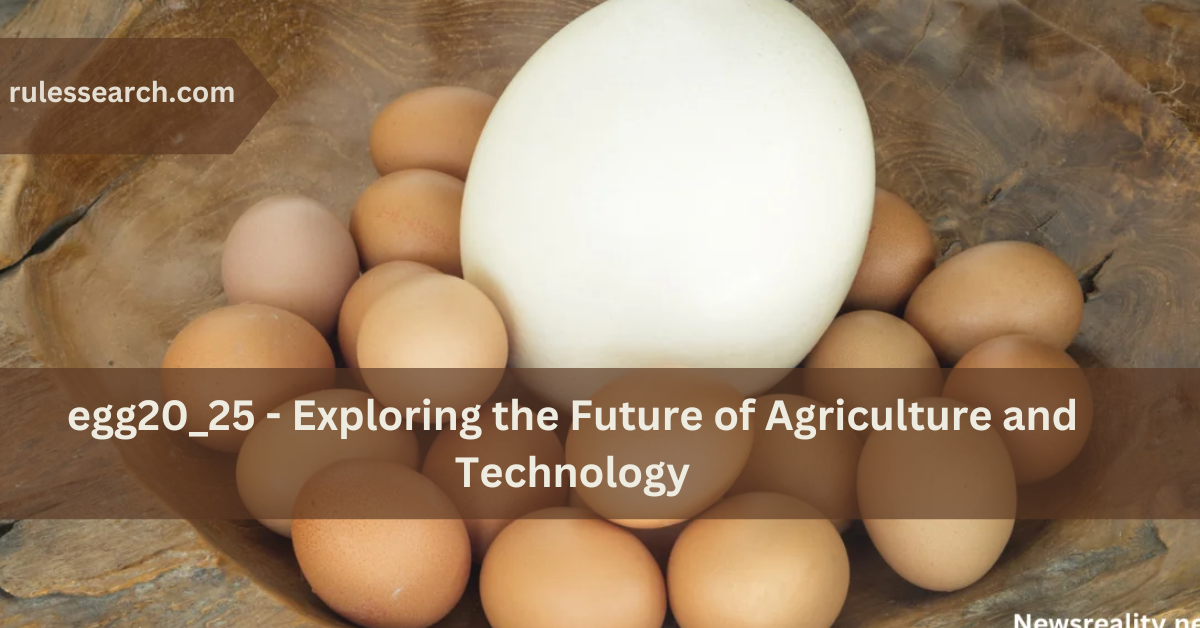In a rapidly evolving world where technology and sustainability are increasingly intertwined, the concept of Egg20_25 emerges as a beacon of innovation and transformative potential. Egg20_25 represents a visionary approach to agriculture and food production that blends technological advancements with sustainable practices. As we stand on the cusp of this exciting future, delving into the details of Egg20_25 offers insights into how it will reshape industries, enhance food security, and foster environmental stewardship.
What is Egg20_25?
Egg20_25 is not merely a buzzword but a forward-thinking concept that embodies the convergence of technology and sustainability in agriculture. This term refers to a future where agricultural systems are significantly enhanced by cutting-edge technologies while remaining firmly rooted in principles of environmental responsibility. The core objective of Egg20_25 is to address current challenges in agriculture—such as resource inefficiency, environmental degradation, and food security—by leveraging innovative solutions and sustainable practices.
Vision and Goals
The vision behind Egg20_25 is to create a future where food production is more efficient, sustainable, and resilient. This involves:
- Technological Integration: Incorporating advanced technologies to optimize farming practices and improve productivity.
- Sustainability: Ensuring that agricultural practices are environmentally friendly and resource-efficient.
- Innovation: Continuously developing new methods and technologies to stay ahead of emerging challenges and opportunities.
The Intersection of Technology and Agriculture
Technological Innovations Shaping Egg20_25
At the heart of Egg20_25 are several technological innovations that promise to revolutionize agriculture. These include:
Precision Agriculture
Precision agriculture is a groundbreaking approach that utilizes data analytics, sensors, and drones to optimize farming operations. Key aspects include:
- Data-Driven Decision Making: Collecting and analyzing data on soil conditions, weather patterns, and crop health to make informed decisions.
- Resource Optimization: Applying water, fertilizers, and pesticides precisely where needed, reducing waste and enhancing crop yields.
- Monitoring and Management: Using drones and sensors to monitor crops and soil in real-time, enabling prompt interventions and adjustments.
Genetic Engineering
Genetic engineering plays a crucial role in the Egg20_25 vision by developing crops and livestock that are better suited to current and future challenges. Key benefits include:
- Disease Resistance: Creating genetically modified crops and animals that are resistant to pests and diseases, reducing the need for chemical treatments.
- Environmental Adaptation: Engineering species that can thrive in diverse environmental conditions, improving resilience to climate change.
- Enhanced Nutrition: Developing crops with improved nutritional profiles to address public health concerns.
Automation and Robotics
Automation and robotics are transforming agricultural operations by performing tasks that were previously labor-intensive. Key advancements include:
- Automated Planting and Harvesting: Using robots to plant, tend, and harvest crops, increasing efficiency and reducing labor costs.
- Precision Machinery: Implementing machinery that can perform specific tasks with high accuracy, such as planting seeds at precise depths and distances.
- Monitoring Systems: Deploying robots equipped with sensors to monitor crop health, soil conditions, and environmental factors.
Sustainable Practices in Egg20_25
Sustainability is a fundamental principle of Egg20_25, encompassing various practices aimed at minimizing environmental impact and promoting long-term agricultural health. Key practices include:
Resource Efficiency
Resource efficiency involves optimizing the use of water, energy, and other inputs to minimize waste. Key strategies include:
- Water Management: Implementing efficient irrigation systems, such as drip irrigation and rainwater harvesting, to conserve water.
- Energy Efficiency: Using renewable energy sources and energy-efficient technologies to reduce the carbon footprint of agricultural operations.
- Nutrient Management: Applying fertilizers and soil amendments in a targeted manner to enhance soil fertility and reduce runoff.
Waste Reduction
Waste reduction focuses on minimizing the generation of agricultural waste and maximizing its reuse and recycling. Key approaches include:
- Composting: Turning organic waste into compost to enrich soil and reduce the need for synthetic fertilizers.
- Recycling: Implementing systems to recycle packaging materials, plastic, and other waste products.
- Circular Economy: Designing agricultural systems that close the loop on waste, converting by-products into valuable resources.
Soil Health
Maintaining and enhancing soil health is crucial for sustainable agriculture. Key practices include:
- Crop Rotation: Alternating crops to prevent soil depletion and reduce pest and disease pressure.
- Cover Crops: Planting cover crops to improve soil structure, prevent erosion, and enhance nutrient content.
- Reduced Tillage: Minimizing soil disturbance to preserve soil integrity and support beneficial microbial communities.
The Impact of Egg20_25 on Food Production
Enhancing Food Security
Food security is a primary goal of Egg20_25, achieved through various strategies:
Increasing Food Production
Technological innovations under Egg20_25 can significantly boost food production by:
- Improving Crop Yields: Utilizing precision agriculture and genetic engineering to enhance the productivity of crops and livestock.
- Expanding Farming Capacity: Implementing vertical farming and other innovative methods to increase food production in urban and restricted areas.
- Enhancing Efficiency: Streamlining farming processes through automation and data-driven insights to maximize output.
Reducing Food Loss
Food loss reduction is a key component of Egg20_25, involving:
- Enhanced Storage: Developing advanced storage technologies to extend the shelf life of perishable goods and reduce spoilage.
- Improved Logistics: Implementing efficient supply chain management systems to minimize food waste during transportation and distribution.
- Consumer Awareness: Educating consumers on reducing food waste and making informed purchasing decisions.
Improving Food Quality
Egg20_25 also aims to enhance food quality through:
Better Nutrition
Technological advancements contribute to improved nutrition by:
- Enhanced Crop Varieties: Developing crops with higher nutrient content to address deficiencies and promote public health.
- Biofortification: Fortifying foods with essential vitamins and minerals to improve their nutritional value.
- Healthier Livestock: Using genetic engineering and nutrition optimization to produce healthier and more nutritious animal products.
Food Safety
Ensuring food safety is a critical aspect of Egg20_25, achieved through:
- Advanced Monitoring Systems: Implementing technologies to detect contaminants and ensure compliance with safety standards.
- Traceability: Using blockchain and other technologies to trace the origin and handling of food products, enhancing transparency and accountability.
- Regulatory Compliance: Adhering to stringent safety regulations and standards to protect consumers and maintain high-quality food products.
The Role of Policy and Regulation
Developing Supportive Policies
For Egg20_25 to achieve its full potential, supportive policies and regulations are essential. Key areas include:
Incentives for Innovation
Governments and institutions can promote Egg20_25 by:
- Funding Research: Providing grants and funding for research and development in agricultural technology and sustainability.
- Tax Incentives: Offering tax credits and deductions for companies investing in innovative and environmentally friendly practices.
- Partnerships: Encouraging collaboration between public and private sectors to drive technological advancements and sustainability efforts.
Regulatory Frameworks
Establishing regulatory frameworks is crucial to ensure the safe and ethical implementation of new technologies. Key considerations include:
- Safety Standards: Developing and enforcing safety standards for genetically modified organisms, pesticides, and other technologies.
- Environmental Regulations: Implementing regulations to protect natural resources and mitigate the environmental impact of agricultural practices.
- Ethical Guidelines: Setting ethical guidelines for the use of technology in agriculture to address concerns related to animal welfare and human rights.
Addressing Ethical and Social Considerations
Egg20_25 must also address ethical and social issues, including:
Equitable Access
Ensuring that the benefits of Egg20_25 are accessible to all stakeholders involves:
- Supporting Smallholder Farmers: Providing resources, training, and technology access to smallholder and emerging farmers.
- Reducing Inequality: Addressing disparities in access to technology and resources between different regions and communities.
Public Acceptance
Building public trust and acceptance is essential for the success of Egg20_25:
- Engaging Communities: Involving communities in discussions about new technologies and addressing their concerns.
- Transparency: Ensuring transparency in the development and implementation of new technologies to build confidence and trust.
Case Studies and Examples
Successful Implementations of Egg20_25 Concepts
Several initiatives exemplify the principles of Egg20_25, demonstrating the potential of integrating technology and sustainability:
Vertical Farming Projects
Vertical farming represents a transformative approach to urban agriculture, utilizing hydroponics and LED lighting to grow food in controlled environments. Key examples include:
- Sky Greens: A vertical farm in Singapore that uses rotating towers to grow vegetables efficiently in limited space.
- AeroFarms: A US-based company specializing in aeroponic vertical farming with a focus on sustainability and resource efficiency.
Genetically Modified Crops
Genetically modified crops have made significant contributions to Egg20_25 by:
- Bt Cotton: Engineering cotton plants to produce a natural insecticide, reducing the need for chemical pesticides.
- Golden Rice: Developing rice enriched with vitamin A to combat nutritional deficiencies in developing countries.
Challenges and Solutions
While Egg20_25 offers numerous benefits, it also presents challenges that must be addressed:
Technological Barriers
High costs and technical complexities can hinder widespread adoption. Solutions include:
- Public-Private Partnerships: Collaborating with government agencies and private companies to share resources and expertise.
- Technology Transfer Programs: Facilitating the transfer of technology and knowledge to developing regions and smaller farms.
Environmental Concerns
Ensuring that new technologies do not harm the environment requires:
- Ongoing Research: Conducting research to assess the long-term environmental impact of new technologies.
- Regulatory Oversight: Implementing and enforcing regulations to prevent unintended environmental consequences.
The Future of Egg20_25
Looking ahead, Egg20_25 represents a pivotal shift in agricultural practices, driven by technological advancements and sustainable practices. Key aspects of this future include:
Preparing for the Future
To fully embrace the potential of Egg20_25, stakeholders should:
- Invest in Research and Development: Prioritize investment in innovative technologies and sustainable practices to drive progress.
- Foster Collaboration: Encourage collaboration between technologists, policymakers, and the agricultural community to address challenges and seize opportunities.
- Address Ethical and Social Considerations: Ensure that technological advancements are implemented equitably and address ethical concerns.
Embracing Change
As we move toward the Egg20_25 future, embracing change and adapting to new technologies will be essential for success. By focusing on innovation, sustainability, and collaboration, we can create a more efficient, resilient, and environmentally conscious agricultural system.
Conclusion
Egg20_25 represents more than a concept—it embodies a transformative vision for the future of agriculture and food production. By integrating advanced technologies with sustainable practices, Egg20_25 promises to address the pressing challenges of modern agriculture while paving the way for a more resilient and efficient agricultural system.
FAQs
What does Egg20_25 refer to?
Egg20_25 is a concept representing the future of agriculture and food production, where technology and sustainability converge to create advanced and environmentally friendly farming practices.
How does precision agriculture fit into Egg20_25?
Precision agriculture uses data analytics, sensors, and drones to optimize farming practices, increase crop yields, and reduce resource waste, aligning with the goals of Egg20_25.
What role does genetic engineering play in Egg20_25?
Genetic engineering contributes to Egg20_25 by developing crops and livestock that are more resistant to diseases and environmental stresses, enhancing productivity and sustainability.
How can Egg20_25 improve food security?
By increasing food production and reducing food loss through advanced technologies, Egg20_25 helps to enhance food security and meet the growing global demand.
What are some examples of successful Egg20_25 initiatives?
Examples include vertical farming projects that use hydroponics and LED lighting and genetically modified crops designed for higher yields and reduced chemical use.
What challenges are associated with Egg20_25?
Challenges include high costs and technical complexities, environmental concerns, and the need for supportive policies and regulations.
How can policymakers support the goals of Egg20_25?
Policymakers can support Egg20_25 by providing incentives for innovation, establishing regulatory frameworks, and ensuring equitable access to new technologies.
What is the role of sustainability in Egg20_25?
Sustainability is central to Egg20_25, focusing on resource efficiency, waste reduction, and maintaining soil health to ensure long-term agricultural productivity.
How can stakeholders prepare for the future of Egg20_25?
Stakeholders can prepare by investing in research and development, fostering collaboration between different sectors, and addressing ethical and social considerations.
What are the long-term benefits of embracing Egg20_25?
Long-term benefits include enhanced food security, improved food quality, reduced environmental impact, and a more resilient and efficient agricultural system.



